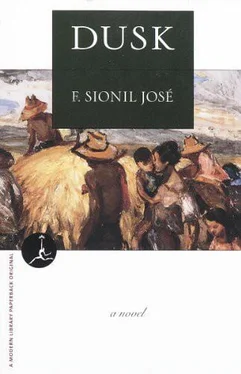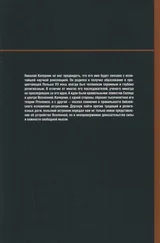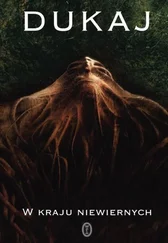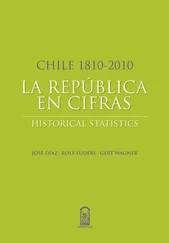She smiled, and in the sunlight her teeth were white and even; she did not chew betel nut or smoke, as did many village women, even when they were still young. They hauled the pallet out of the cart; it was heavy and Istak marveled at her strength. He sharpened two lengths of bamboo, then drove the stakes into the ground on both sides of the pit. He tied two lengths of rope then laid the ropes over the grave. They eased the pallet over the ropes and lowered it slowly till it rested snugly at the bottom. Istak intoned the ritual prayer: Tibi Domine commendamus animam famuli, tui, ut defunctum saeculo, tibi vivat …
Beyond the river, from the direction of the sea, the wind careened toward them with the smell of burnt fields. Istak started shoveling back the earth. This was the end, this was the end, and Dalin crumpled on her knees and cried silently at first, then she took a deep breath, and softly, as if in a whisper so that her voice would not travel, she started the wail of the widow.
Ay, I am now alone,
cover to the pot,
useless without you.
What have you left,
salt on my lips,
darkness in my mind.
Why now should I live,
with no blood in my veins,
no breath in my lungs.
Ay, I am now alone.
Istak continued shoveling the earth till a mound formed over the grave. Dalin finally rose. Her eyes were clear; she had no more tears. With her hands, she helped smooth the mound. And the rest of the earth they spread out to mix with the sand so that it would look level, not a grave but some spot where, perhaps, someone had dug up an old pine tree trunk to bring home as kindling wood. The tall grass was not disturbed; it would only be by accident that some boy would stray here, adventuring in this wasteland, and even then, he would not bother wondering what lay beneath this mound. The rains would soon come, grass would sprout even taller, and the flesh of the dead would feed those new roots.
If he returned home, he would have to wash his feet with warm water in the earthen pot laid at the foot of the stairs to cleanse his body and protect the house from the wandering ghost. There might be no such water waiting for him, so Istak said he would go to the river to bathe himself instead. He asked if she wanted to join him and she nodded. He sought privacy behind a screen of grass, where he stripped. Cupping his genitals with his hand he waded into the water and immersed himself quickly. The water was waist-deep, a soothing coolness in the heat. Somewhere, behind some tall reeds, Dalin was splashing. Like all the women who bathed in the river, she did not take off her clothes. Her wet chemise would now be clinging to her body, outlining her shoulders, her breasts. He had reproached himself for such lascivious thoughts — very disturbing but pleasurable — many times in the past, particularly when he conducted those lessons for Capitán Berong’s pretty daughters. The delicious yet forbidden urge would ride down his whole being and flood him with warmth. He was past twenty and still a virgin. For how much longer? When would he finally know a woman?
He let the feeling subside, and after a while, he rose from the water, and cupping his limp manhood in his palm again, he hurried to the tall grass and, still dripping, put on his clothes, which were damp with sweat. He waited till Dalin called out to him that she was ready.
When he returned to the cart, it was still unhitched. In the shade of a camachile tree, Dalin had already laid on the stubby grass a palm-leaf mat with their food — chunks of leftover rice that she had cooked the night before, scraps of salted meat cooked in vinegar, salt, and oil, and small peanut cakes. Her hair was loose and wet and she looked even younger.
“Will you pray the nine-day novena by yourself and keep the year of mourning?” he asked.
She nodded. “Everything else that must be done I will do.”
When they were through eating, she gathered the leftovers carefully and placed the pots back in the cart. “Please,” she reminded him. “If they ask …”
He nodded. He did not want to lie but he had to.
“I will leave you at the fork of the road,” she said. “I will travel only in the day. At night, I will try to find a place where I can be safe. Then when I reach the sea, I will sell this cart and bull and return home by boat.”
“You are very brave.”
“I wish I had more knowledge,” she said. “Not just writing my name and counting. I wish I had a little of what you know.”
“Who told you about me? I am just a farmer.”
“Your brother,” she said. “On the way to your village last night he spoke about you, how learned you are and how you should be in Vigan, or even Manila.”
“There are people who cannot even write their names,” Istak said. “But they are wiser than most who can read.” He turned to her; her skin, freshly scrubbed, was smooth and clear. She was really no more than eighteen — he could see that clearly now.
She bowed and said softly, “I am ignorant, I know.” Then she turned to him, pride in her eyes. “But at least I can write my name.”
“That is good, a beginning,” Istak said quickly. “I was thinking, here in our village many cannot read. I can be a teacher. The catón . And the neighbors will pay not with money but with grain.”
“Is that what you are planning to do?”
“Yes, but I’ll farm, too.”
“What was it like living with a priest?” she asked.
“It was not easy,” he explained. “My time was well divided between my chores and my efforts to improve myself. The work was tiring, too — cleaning the kumbento , chopping firewood, looking after the horses, six of them. The easier tasks, keeping the files, the registry of births, marriages, deaths. And after that, the lessons the old priest gave — science, some botany …” He realized quickly that she did not understand.
Istak turned away as they came creeping back — memories of all those years, wasted now. When he entered Padre Jose’s room for the first time, he was awed by the old books all over the place, leather bound, some of them with gilt edges. Before the old priest had selected him to be a sacristan, all that he knew was the church itself — how massive it was, its walls thick and impregnable, the wood in the sacristy and the kumbento the best that could be dragged from the mountains. Portions of the kumbento were roofed with tile, but the church itself was roofed with galvanized iron, which had rusted in parts.
As a child, he had believed that when huge buildings or churches were built, a fearsome creature called Komaw would kidnap children, kill them, and spill their blood into the foundation diggings so that the buildings would be so blessed they would last a thousand years and those constructing them would not be injured. Surely, it must have taken pails of blood to make this church endure. He had wanted to ask the priest but never dared, for Padre Jose, Istak learned later, was skeptical about the many miracles the other churches claimed and had a surfeit of, a skepticism which the old priest did not voice but which Istak knew was there — in the shaking of the venerable head, in the lift of the thick eyebrows when such topics were brought to him.
The church was more than a hundred years old; he had often imagined the multitude of workers hauling those big rocks and cutting them in perfect shapes to make arches that could withstand earthquakes. He wondered why the church was built on a rise of ground on the fringes of the town — not in the middle as it was with the other churches. The church was like a fort; indeed, it was a sanctuary from Moro raids along the coast — self-sustained, with granaries, wells.
When he was new in the church, one of his chores was to toll the bells. He had delighted in climbing up to the belfry and once up there, past the dim stairway, the wind whistling through, he would scan the vista around him, and look to the far distance, to Po-on, where he came from, where time began — just a smudge of brown hidden by bamboo groves, the river that emerged out of the low hills like a trough of silver and disappeared in the narrow plain, and all around the town, the fields ready for the seed, or — as it was in November and December — a sea of shimmering gold. He would hurry down after the Angelus, the tolling of the bells still humming in his ears, and in the sacristy join the singing: Tantum ergo, tantum ergo . Then to the kitchen where, with the other boys, he helped with the cooking and setting of the table in the dining room, above it a broadcloth which was swung continuously to stir a breeze when it was warm or to drive away the flies. Here was the chipped china, the polished candelabra, the frayed gray napkins, and Padre Jose’s simple dinner of chicken broth, some vegetables, and rice that was cooked soft.
Читать дальше












